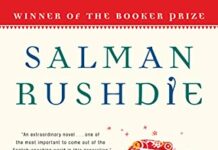
Ebook Info
- Published: 2008
- Number of pages: 370 pages
- Format: EPUB
- File Size: 0.57 MB
- Authors: Salman Rushdie
Description
A tall, yellow-haired, young European traveler calling himself “Mogor dell’Amore,” the Mughal of Love, arrives at the court of the Emperor Akbar, lord of the great Mughal empire, with a tale to tell that begins to obsess the imperial capital, a tale about a mysterious woman, a great beauty believed to possess powers of enchantment and sorcery, and her impossible journey to the far-off city of Florence.The Enchantress of Florence is the story of a woman attempting to command her own destiny in a man’s world. It is the story of two cities, unknown to each other, at the height of their powers–the hedonistic Mughal capital, in which the brilliant Akbar the Great wrestles daily with questions of belief, desire, and the treachery of his sons, and the equally sensual city of Florence during the High Renaissance, where Niccolò Machiavelli takes a starring role as he learns, the hard way, about the true brutality of power.Vivid, gripping, irreverent, bawdy, profoundly moving, and completely absorbing, The Enchantress of Florence is a dazzling book full of wonders by one of the world’s most important living writers.
User’s Reviews
Reviews from Amazon users which were colected at the time this book was published on the website:
⭐Bought again as I lost originally bought and read. One of those books you want to go back and read again. Es so witty
⭐I bought the book after listening to an interview with Rushdie that happened to coincide with the beginnings of my teaching the Renaissance. It is an epic tale with many layers. It’s quite complex and detailed. And it ends just like my review. Suddenly.
⭐I’ve been a fan of Rushdie for a long time and have read all of his fiction. While two reviewers in The New York Times (Michiko Kakutani and David Gates) gave “The Enchantress of Florence” negative reviews, I have learned to distrust reviews of professional reviewers of fiction; I’m convinced that they are no longer able to truly enjoy fiction the way ordinary readers do since they cannot allow themselves to sink into the world created by the author but must instead maintain a critical distance. While their critical stance might allow them to enjoy some fiction, I think it completely interferes with their ability to appreciate a work of fantasy like “The Enchantress of Florence”. Rushdie is a great storyteller and his books are easy to enjoy if you allow yourself to believe in his characters and settings despite their frequent lack of reality.I enjoyed this book very much. I found the settings and characters interesting and enjoyed it’s reflections about storytelling and its story-within-story framing narrative. While there is a sharp departure from India to Italy in the second part of the book, Rushdie does ultimately tie everything together in a satisfactory way that explains the mystery of the character known as the “Mogor dell’Amore”. If you keep reading, your patience will be rewarded.I particularly enjoyed Rushdie’s account of Akbar the Great and his capital city of Fatehpur Sikri in northwest India. In fact, when I had a chance to visit India 4 months later, I made a point of visiting Fatehpur Sikri which is one hour from Agra where the famed Taj Mahal is. Most tourists to India visit Agra but don’t take the time to visit Akbar’s city. The beautiful red sandstone buildings are well-preserved and definitely worth visiting for a half or whole day. My visit to Fatehpur Sikri was one of the highlights of my trip to India, in part because I could picture Akbar and his court thanks to Rushdie’s vivid account of them.
⭐From the very first page I knew this author was an artist. This is my first experience with his work and there is no doubt in my mind that this man has the gift of words. His sentences are long and complex, sometimes running a whole page. His characters are extraordinary and richly imaged. The story is often shocking in its brutality, bawdiness and irreverence. And magic realism is everywhere.Set in the 16th century, the story moves between the Indian Mughal Empire and the city of Florence during the Renaissance. The characters are all larger than life and the plot revolves around an aunt of the Mughal Emperor. She is a mysterious enchantress and as her story unfolds we get a glimpse of the world though the intricate mosaic of the author’s words. At times the plot seemed entirely irrelevant as I found it hard to follow and instead focused on the way the story was told rather than the story itself.I think I would have appreciated the book more if I had some background of the real history of the time because the author used it as a starting point and let his imagination take over from there. Often I was confused but I couldn’t help but be enchanted by the power of the use of the words.This is not a book for everyone. I can’t even quite explain what it was about. I just know that I was glad I read it.Recommended only for the adventurous few.
⭐This is my first Rushdie novel. Other than the fatwa associated with “The Satanic Verses,” my first real exposure to him was an interview with Charlie Rose last year. After watching that interview, I became intrigued and decided to try either “Midnight’s Children,” “The Satanic Verses” or this.I was not disappointed. Rushdie’s storytelling, his imagination and his command of the English language are unmatched.The premise is unique…a golden haired foreigner makes his way to India to share a story with the Mughal Emporer Akbar. Rushdie gradually unfolds the tale in mesmerizing style. The narrrative is enhanced by the Indian and Italian settings and by the frequent references to historical figures including Genghis Kahn, the Medici’s, Vlad the Impaler and a host of others.The writing is spectacular!! Normally I prefer the compactness of a Hemingway, but Rushdi’s flowing style reads well, and his command of language and his imagination are beyond compare. On a number of occassions I paused to admire the beauty of his sometimes page-long sentences and his flawless inclusion of words that I have not seen since college (and some not even then).It is only fair to add that Rushdie is not for everyone. The things that make this book magnificent will not necessarily appeal to everyone. But they appealed to me!! After a pause to catch my breath, I will be on to “Midnight’s Children.”
⭐I liked the plot and the mystery of who was Mogor del’ amore, and using magical realism to reveal the mystery towards the end. However, this was my first Salman Rushdie novel and I found it overly verbal. Sometimes it felt more poetic than prose. Some of the pages felt philosophically intense to describe a simple story. In the end, it proved somewhat painful to read but gave an extremely rich taste of Moghul grandeur and the renaissance period. Characters such as the Skeleton, Mattress, Swiss giants, Mirror and the 3 damsels Simonetta, Alessandra and Qara Koz made the novel memorable.
⭐I hate to ditch a book before finishing it but I feel that, at halfway through, that has become a real option. This book is so over-written. With all the hype about Rushdie I was expecting a piece of literature to rival the work of the modern greats – writers of the calibre of Roth, Mailer, and others – but this is a muddled string of self-indulgence. The main ‘story’ becomes sidelined by diversions into rambling anecdotes that fail to add meaning or exert any significance and I’m left with the sense of a tedious passage of literary onanism that lacks pace and enlightenment. The author seems to be driven by a need to impress his claim to literary erudition but it just produces a false mantle with little ease of delivery. That’s enough Rushdie for me. Pity.
⭐ReviewI have not read very much Rushdie and I was not sure what I would make of this book. Going by the reviews it seems to divide opinion, but I loved it.The book is like an incredible tapestry, rich in imagery, history (it comes with a long bibliography), descriptions, themes and characters. Although a work of historical fiction, as Rushdie has said: “non-historians think of history as being a collection of facts, whereas actually it’s not — it’s a collection of theories about the past. We revise our view of the past all the time, depending on our own present concerns.”As rationalist westerners we see history through our realism focused eyes. But the worlds that Rushdie draws – the Mughal court and Renaissance Florence – believed in magic, enchantment and religion. It is therefore only right that a book set in such a world should share those belief structures. Accurate historical fiction is magic realism and that is what Rushdie writes brilliantly, for example the Great Mughal, Akbar, has a fantasy wife, who exists not only in the mind of Akbar but also on Rushdie’s pages as an independent character.Of all the characters the best drawn is Akbar, who is a mass of contradictions, a bloody tyrant who meditates on the role of kingship, religion and identity. The yellow-haired Italian stranger is less well drawn with good reason because we are viewing him through Akbar’s eyes and Akbar cannot tell whether the stranger’s story is true or not and he and we never know. We are shown at the beginning of the book how ruthless the stranger can be in pursuing his own interests. Rushdie has been criticised by some readers as being anti-women in this book, defining women by their sexuality, as whores or sexual enchantresses. Although a feminist and a liker of strong women characters this aspect of the book did not bother me. Rushdie is accurately depicting the world of the Mughals and Renaissance Italy and the place of women in it. The enchantress of the title uses her sexual beauty and force of will to bind men to her. The book closes with her saying to Akbar, “And now, Shelter of the World, I am yours.” And Akbar thinking “Until you’re not, my Love. Until You’re not” for the Enchantress had always moved on from one man to another as their power to protect her fails. The power of men is shown throughout the book to be fragile and short, even Akbar’s great palace is brought to dust. Perhaps, one wonders, the only power that survives is that of the illusion of the perfect woman.This review first appeared on the Magic Realism Blog – […]
⭐I read it twice and may read it again, and possibly once more. I have had to do that with another of his books. What is so appealing and rewarding is the complexities and the scholarship; the breath of historical scope and allegory and the fantasy, such as the Emperor’s virtual queen. Nothing you’ve ever read before will take you further away from reality and keep you more enchanted.Like in the “Verses” you gain more insight the more time you take over a Rushdie, so don’t rush it.
⭐Oh to read a beautiful book again. This is up there with The Moor’s Last Sigh and so breathtakingly skilful you forget the craft and just wallow in the writing. Rushdie is unlike any other writer I know – untouchable maybe for his sheer (effortless) ability to bring you into a world and weave his magic so you cannot leave til the last page. There are not many books I would wish to read twice, but this is definitely one of them. Thank goodness Rushdie is back on top form.
⭐SAFE READING – NO SPOILERSFor story details, please read other reviews but beware of having your enjoyment slightly neutered.For Rushdie fans, this is another excellent read, sustaining the style, content level and interest of his other works in an unusual story and plot. For anyone who has not read him before, it may not be the best entry level text but it is well worth the time and effort.Thoroughly enjoyable and recommended.
Keywords
Free Download The Enchantress of Florence: A Novel in EPUB format
The Enchantress of Florence: A Novel EPUB Free Download
Download The Enchantress of Florence: A Novel 2008 EPUB Free
The Enchantress of Florence: A Novel 2008 EPUB Free Download
Download The Enchantress of Florence: A Novel EPUB
Free Download Ebook The Enchantress of Florence: A Novel





